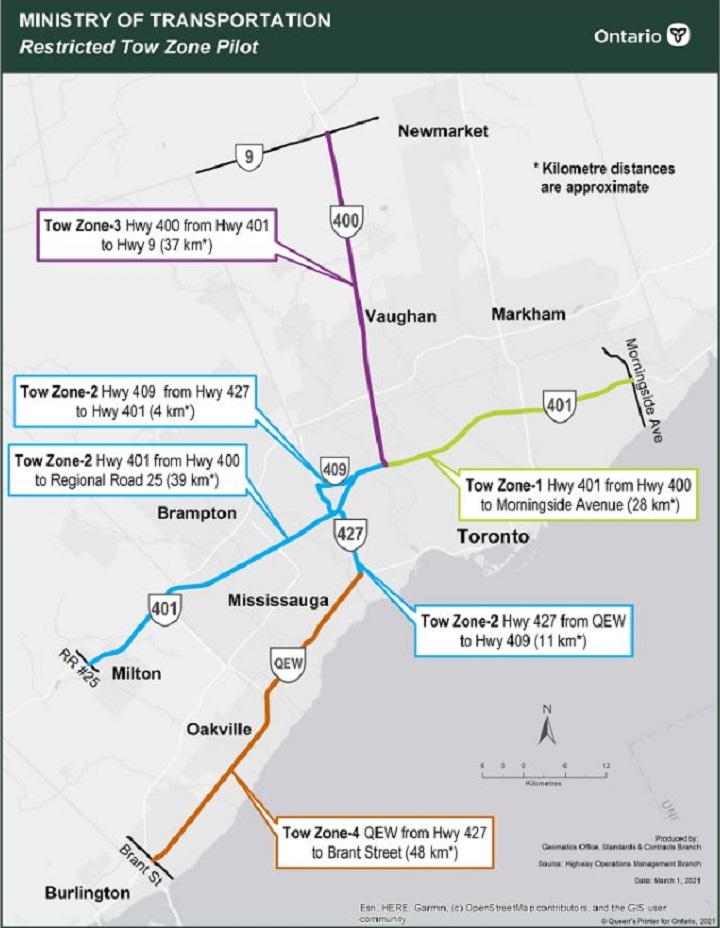The Ontario government is moving toward enacting various reforms for the province’s tow truck industry, including the licensing of drivers, and is seeking to crack down on violence within it.

Transportation Minister Caroline Mulroney and Solicitor General Sylvia Jones unveiled the suite of measures at Queen’s Park Tuesday morning months after a provincial task force on the industry was struck.
“Tow truck drivers are a vital part of keeping Ontario moving, but they are operating in an industry that lacks oversight, structure and where too many criminals are making their own rules,” Jones said.
“The steps taken today will overhaul the way our towing industry operates and the people of Ontario deserve no less.”
Officials said they are moving to create an oversight model and a licensing regime, but the finite details still need to be unveiled.
It was also announced that a joint forces operation team led by the Ontario Provincial Police in partnership with local police services will focus on criminal investigations.
OPP Commissioner Thomas Carrique said incidents of violence (e.g. shootings, assaults and arsons) have been escalating more recently, attributing it to turf wars between “criminal networks seeking to gain control over drug trafficking, frauds and corruption schemes being perpetrated by illegitimate tow truck operators.”
A new restricted tow truck zone pilot project on multiple 400-series highways was also announced. Mulroney said the project will last for a minimum of two years.
It will see only one approved tow truck operator for each of the following highway sections: Highway 400 between Highway 401 in Toronto and Highway 9 in King, Highway 401 between Morningside Avenue in Scarborough and Rural Road 25 in Milton, Highway 409 between Highways 401 and 427, Highway 427 between the Queen Elizabeth Way and Highway 409 and the Queen Elizabeth Way between Brant Street in Burlington and Highway 427 in Toronto.
“This approach will eliminate the practice of accident chasing within the tow zones, which has been a dangerous trend in the industry,” Mulroney said.
She also said OPP will have the authority to call in a different tow operator should the need arise, adding the approach should help speed up clearing scenes. Mulroney said the standard response time for typical incidents will be 30 minutes and clearing it within 90 minutes.
Within the restricted tow zones, Mulroney said there will be standardized pricing for services so “nobody is getting gauged when they’re at their most vulnerable.”

Get breaking National news
“These are the latest steps in our comprehensive plan to strengthen safety and standards for the towing industry so that we can put an end to violence and criminal activity,” she said.
“The safety of the people of Ontario will always be our top priority.”
Mark Graves, president of the Provincial Towing Association of Ontario, said he’s waiting for the details surrounding the oversight and licensing in order to know if it will be effective.
“Just like all other rules, regulations, legislation, it’s only as good as the teeth that are put into it and the enforcement that’s behind it so signing a piece of paper doesn’t make it better,” he told Global News.
When the task force was initially announced in June, Premier Doug Ford highlighted acts of violence.
“There’s a small group of bad apples out there causing trouble, lighting trucks on fire, smashing windows and getting mixed up in organized crime. That ends now,” Ford said in June, referring to reported criminal activity and violence.
“We will hold them accountable. We will increase enforcement, strengthen consumer protection and improve industry standards.”
In May, York Regional Police revealed the results of Project Platinum, which saw police forces across the Greater Toronto Area and the Canada Revenue Agency identify several organized crime groups working within the towing industry who used violence and property damage to gain control and territory within the industry.
According to the government, there are about 1,600 tow truck companies registered in the Ministry of Transportation’s commercial vehicle operator’s registration (CVOR) program. The government said a valid CVOR certificate is required to operate a tow truck.
— With files from Gabby Rodrigues and Morganne Campbell















Comments